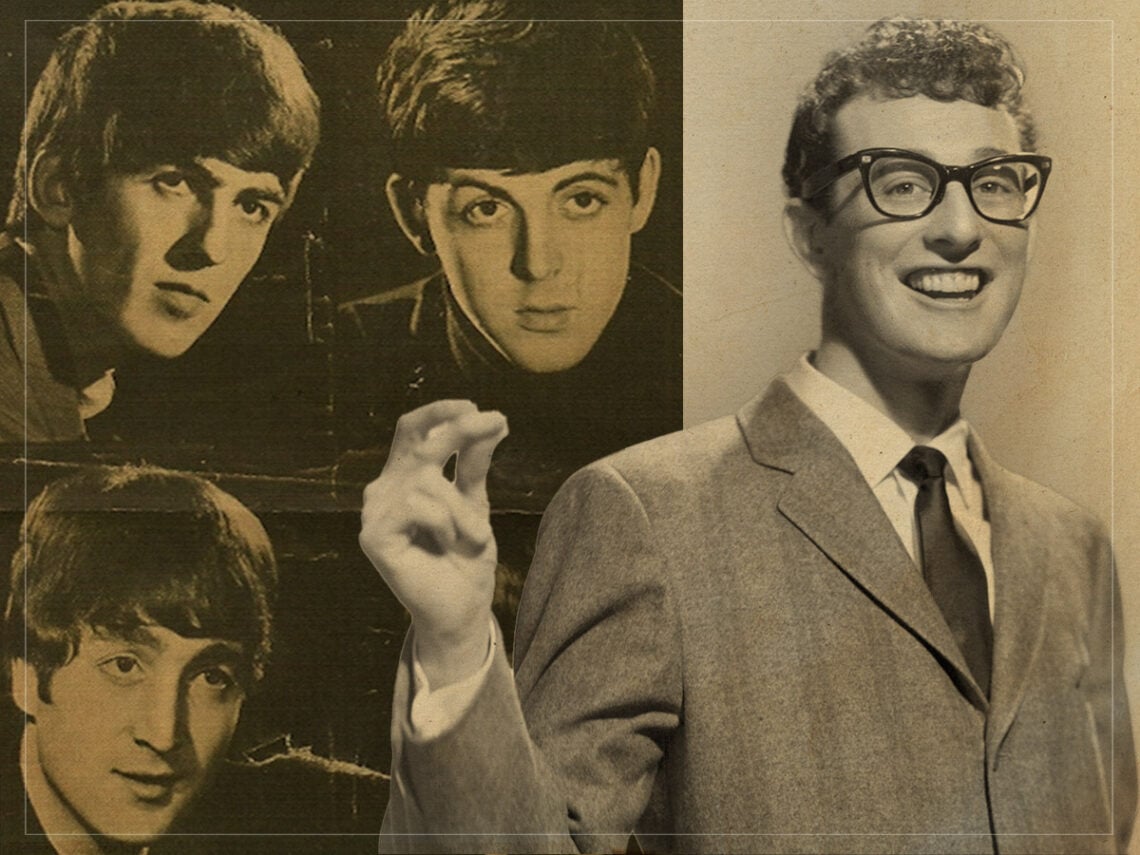
(Credits: Far Out / Bradford Timeline / Brunswick Records)
Wed 29 October 2025 23:00, UK
It’s often been said that the rise of punk rock in the 1970s was revolutionary in how it gave every small-time musician, regardless of their background or skill level, the belief that they could “make it”. Following that logic, one might argue that Buddy Holly, the bespectacled good ol’ boy from Lubbock, Texas, was truly the first punk.
That’s not to say that Holly wasn’t a seasoned and highly practised songwriter and guitarist, but in a world where image was still an essential component of fame for most pop stars, including the earliest faces of rock, à la Elvis Presley and Little Richard, he was an entirely different sort of entity for the next generation to hitch their wagons to. He was an ordinary-looking fellow churning out extraordinary songs, and he seemed to emerge fully formed as a new kind of icon, taking the charts by storm with his first hit single, 1957’s ‘That’ll Be the Day.’
Inspired by a line spouted repeatedly by John Wayne’s surly Ethan Edwards character in the 1956 western movie The Searchers, ‘That’ll Be the Day’ actually had a bit of a complicated path toward immortality, as Holly’s original 1956 recording of the track with his early band The Three Tunes didn’t meet the satisfaction of his record label Decca. A re-worked version with the Crickets a year later met a far better fate, as its release in the summer of 1957 timed up perfectly with the nationally televised debut of the American Bandstand programme in the US, which featured the Holly track on its very first episode.
That exposure helped send ‘That’ll Be the Day’ soaring up the charts to number one, and soon enough, Holly and the Crickets were invited onto American Bandstand and The Ed Sullivan Show to play their hit live, helping cement Buddy’s image in popular culture; all this and he was still just a couple weeks shy of his 21st birthday.
His slightly twangier and more vulnerable take on jump n’ jive rock n’ roll had an enormous impact on up-and-coming bands all over the US, and that wave quickly reached across the ocean, as ‘That’ll Be the Day’ hit number one in the UK and inspired thousands of young British musicians who’d already been seduced by the skiffle sound to take the next logical step.
“Buddy Holly was one of us,” Graham Nash told MusicRadar in 2012, “He wasn’t Elvis Presley, he wasn’t James Dean, he didn’t have slicked-back hair, he didn’t swivel his hips. He was one of us, a fucking nerd with glasses.”
Nash and his bandmates paid Buddy the ultimate tribute by naming their Manchester-based rock band The Hollies in 1962, a few years after his untimely death. Meanwhile, over in Liverpool, in 1958, a band of teen rockers called The Quarrymen had also proudly cut their teeth playing Buddy Holly covers, which saw John Lennon, Paul McCartney, and George Harrison, along with drummer Colin Hanton and John ‘Duff’ Lowe go into a studio for the first time, playing a cover of ‘That’ll Be the Day’ and paying 17 shillings to get it recorded and put on a single ten-inch shellac record.
As McCartney told the tale when that recording finally saw the light of day on The Beatles Anthology collection in 1995, “When we got the record, the agreement was that we would have it for a week each. John had it a week and passed it on to me. I had it for a week and passed it on to George, who had it for a week. Then Colin had it for a week and passed it to Duff Lowe, who kept it for 23 years.”
The Quarrymen, of course, later changed their name to a Crickets-inspired moniker, The Beatles, and all members would continue to sing Buddy Holly’s praises for years, with John Lennon calling him “a great and innovative musician… What he did with three chords made a songwriter out of me”.
“He was a master,” Lennon added, writing to critic Jim Dawson in 1974 in response to a question about Holly’s impact on The Beatles and the rest of UK pop, noting, “His influence continues. I often wonder what his music would be like now, had he lived”.
Related Topics
The Far Out Beatles Newsletter
All the latest stories about The Beatles from the independent voice of culture.
Straight to your inbox.
